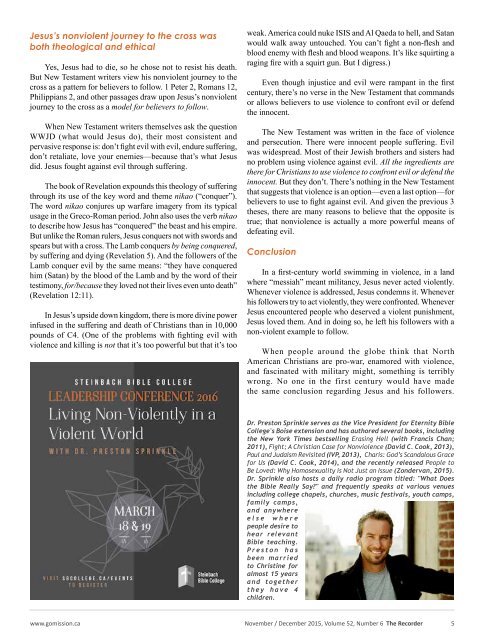You also want an ePaper? Increase the reach of your titles
YUMPU automatically turns print PDFs into web optimized ePapers that Google loves.
Jesus’s nonviolent journey to the cross was<br />
both theological and ethical<br />
Yes, Jesus had to die, so he chose not to resist his death.<br />
But New Testament writers view his nonviolent journey to the<br />
cross as a pattern for believers to follow. 1 Peter 2, Romans 12,<br />
Philippians 2, and other passages draw upon Jesus’s nonviolent<br />
journey to the cross as a model for believers to follow.<br />
When New Testament writers themselves ask the question<br />
WWJD (what would Jesus do), their most consistent and<br />
pervasive response is: don’t fight evil with evil, endure suffering,<br />
don’t retaliate, love your enemies—because that’s what Jesus<br />
did. Jesus fought against evil through suffering.<br />
The book of Revelation expounds this theology of suffering<br />
through its use of the key word and theme nikao (“conquer”).<br />
The word nikao conjures up warfare imagery from its typical<br />
usage in the Greco-Roman period. John also uses the verb nikao<br />
to describe how Jesus has “conquered” the beast and his empire.<br />
But unlike the Roman rulers, Jesus conquers not with swords and<br />
spears but with a cross. The Lamb conquers by being conquered,<br />
by suffering and dying (Revelation 5). And the followers of the<br />
Lamb conquer evil by the same means: “they have conquered<br />
him (Satan) by the blood of the Lamb and by the word of their<br />
testimony, for/because they loved not their lives even unto death”<br />
(Revelation 12:11).<br />
In Jesus’s upside down kingdom, there is more divine power<br />
infused in the suffering and death of Christians than in 10,000<br />
pounds of C4. (One of the problems with fighting evil with<br />
violence and killing is not that it’s too powerful but that it’s too<br />
weak. America could nuke ISIS and Al Qaeda to hell, and Satan<br />
would walk away untouched. You can’t fight a non-flesh and<br />
blood enemy with flesh and blood weapons. It’s like squirting a<br />
raging fire with a squirt gun. But I digress.)<br />
Even though injustice and evil were rampant in the first<br />
century, there’s no verse in the New Testament that commands<br />
or allows believers to use violence to confront evil or defend<br />
the innocent.<br />
The New Testament was written in the face of violence<br />
and persecution. There were innocent people suffering. Evil<br />
was widespread. Most of their Jewish brothers and sisters had<br />
no problem using violence against evil. All the ingredients are<br />
there for Christians to use violence to confront evil or defend the<br />
innocent. But they don’t. There’s nothing in the New Testament<br />
that suggests that violence is an option—even a last option—for<br />
believers to use to fight against evil. And given the previous 3<br />
theses, there are many reasons to believe that the opposite is<br />
true; that nonviolence is actually a more powerful means of<br />
defeating evil.<br />
Conclusion<br />
In a first-century world swimming in violence, in a land<br />
where “messiah” meant militancy, Jesus never acted violently.<br />
Whenever violence is addressed, Jesus condemns it. Whenever<br />
his followers try to act violently, they were confronted. Whenever<br />
Jesus encountered people who deserved a violent punishment,<br />
Jesus loved them. And in doing so, he left his followers with a<br />
non-violent example to follow.<br />
When people around the globe think that North<br />
American Christians are pro-war, enamored with violence,<br />
and fascinated with military might, something is terribly<br />
wrong. No one in the first century would have made<br />
the same conclusion regarding Jesus and his followers.<br />
Dr. Preston Sprinkle serves as the Vice President for Eternity Bible<br />
College's Boise extension and has authored several books, including<br />
the New York Times bestselling Erasing Hell (with Francis Chan;<br />
2011), Fight; A Christian Case for Nonviolence (David C. Cook, 2013),<br />
Paul and Judaism Revisited (IVP, 2013), Charis: God’s Scandalous Grace<br />
for Us (David C. Cook, 2014), and the recently released People to<br />
Be Loved: Why Homosexuality is Not Just an Issue (Zondervan, 2015).<br />
Dr. Sprinkle also hosts a daily radio program titled: "What Does<br />
the Bible Really Say?" and frequently speaks at various venues<br />
including college chapels, churches, music festivals, youth camps,<br />
family camps,<br />
and anywhere<br />
else where<br />
people desire to<br />
hear relevant<br />
Bible teaching.<br />
Preston has<br />
been married<br />
to Christine for<br />
almost 15 years<br />
and together<br />
they have 4<br />
children.<br />
www.gomission.ca November / December 2015, Volume 52, Number 6 The Recorder 5


